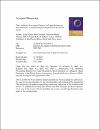Antibiotic Prescription Patterns for Upper Respiratory Tract Infections in Outpatient Qatari Population in the Private Sector

View/
Publisher version (Check access options)
Check access options
Date
2016-12-09Author
Butt, Adeel AjwadNavasero, Cristina S.
Thomas, Bright
Al Marri, Salih
Al Katheeri, Huda
Al Thani, Asmaa
Al Khal, Abdullatif
Khan, Tasnim
Abou-Samra, Abdul-Badi
...show more authors ...show less authors
Metadata
Show full item recordAbstract
Background: Antibiotic are often inappropriately prescribed for upper respiratory infections (URI) in the
Western countries. Data on the proportion of inappropriate prescriptions are lacking from the Middle
East and other developing countries.
Methods: We retrieved health insurance claims for all antibiotics prescribed for URIs in the private
sector in the State of Qatar between May 2014 and December 2015. During the study period, health insurance was limited to Qatari nationals. We excluded topical antibiotics. We also retrieved data on
prescriber’s specialty as listed with the licensing authority. Diagnoses were classified as appropriate or
inappropriate based on the likelihood of a bacterial etiology which may warrant antibiotic use.
Results: There were a total of 75,733 claims during the study period. Of these, 41,556 (55%) were for an
appropriate indication, while 34,177 (45%) were for an inappropriate indication. Most common
antibiotic classes were cepahlosporins (43% of claims; 44% inappropriate), penicillins (28% of claims;
44% inappropriate), macrolides (19% of claims; 52% inappropriate) and fluoroquinolone (9% of claims;
40% inappropriate). Nearly 5% of antibiotics were intravenous formulations. The most common
prescribers were General/Family physicians (53% of claims; 50% inappropriate), followed by Pediatrics
(18.6% of claims; 36% inappropriate) and Internal Medicine (14.1 of claims; 44% inappropriate).
Conclusions: There is a high rate of inappropriate antibiotic prescription for acute URIs in the private
health care sector in the State of Qatar. Further studies are needed to determine the population-based
rates across the country. Interventions to decrease inappropriate use in such settings are urgently needed.
Collections
- Biomedical Sciences [847 items ]


